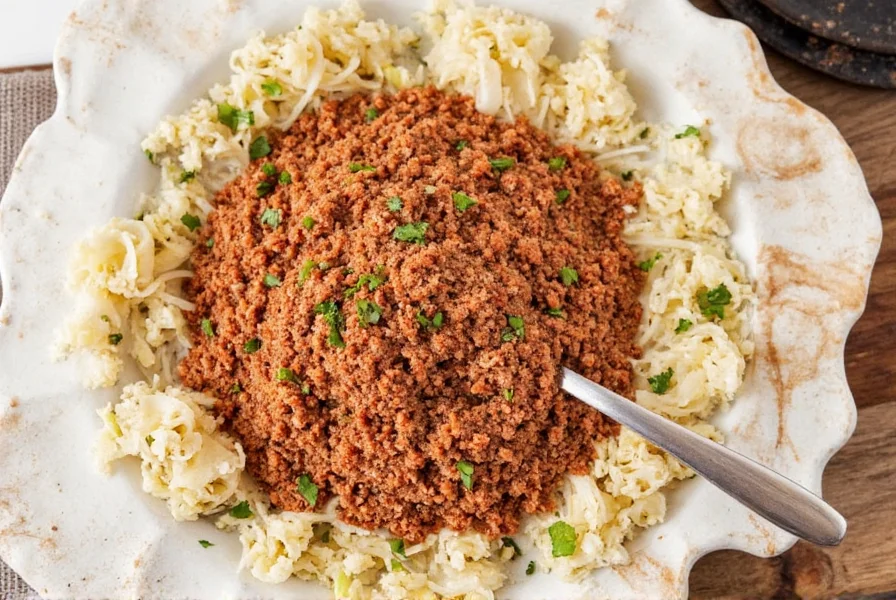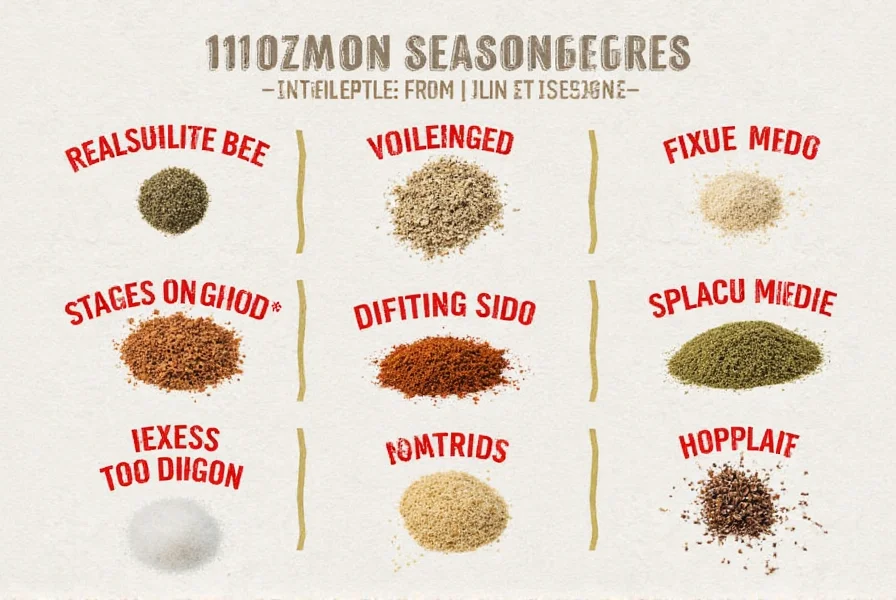Table of Contents
- What Is Sazon Seasoning? (Complete Definition)
- Sazon Seasoning Ingredients Breakdown
- How to Use Sazon Seasoning: Practical Measurements & Applications
- Sazon Seasoning Substitute Options When You're Out
- Sazon vs Adobo: Key Differences Explained
- Best Sazon Brands Ranked: Goya, McCormick & More
- How Long Does Sazon Last? Proper Storage Guide
- Frequently Asked Questions About Sazon Seasoning

What Is Sazon Seasoning? (Complete Definition)
Sazon seasoning is a vibrant Latin spice blend primarily used in Puerto Rican, Dominican, and other Caribbean cuisines that contains annatto (achiote) for color and a distinctive blend of garlic, cumin, coriander, and other spices. Unlike many seasoning blends, sazon's signature golden-orange hue comes from annatto seeds, which provide both color and subtle peppery flavor. It's the essential ingredient that gives authentic Latin dishes like arroz con pollo, pernil, and beans their characteristic appearance and complex flavor profile.
Sazon Seasoning Ingredients Breakdown
Authentic sazon contains these core ingredients that create its signature flavor and color. Commercial blends vary slightly, but all contain these essential components:
| Ingredient | Percentage in Typical Blend | Function |
|---|---|---|
| Annatto (Achiote) | 15-20% | Provides signature golden-orange color and subtle earthy flavor |
| Garlic Powder | 25-30% | Creates savory backbone of the blend |
| Cumin | 20-25% | Adds warm, earthy depth |
| Coriander | 10-15% | Contributes citrusy notes that balance the earthiness |
| Salt | 15-20% | Enhances all flavors and acts as preservative |
| Black Pepper | 5-10% | Adds mild heat and complexity |

How to Use Sazon Seasoning: Practical Measurements & Applications
Knowing exactly how much sazon to use is critical - too little won't flavor properly, too much can overpower your dish. Follow these professional guidelines:
- For 1 pound of meat: Use 1 teaspoon of sazon seasoning (mix with 2 tablespoons oil for marinades)
- For rice dishes: Add ½ teaspoon per cup of uncooked rice directly to cooking water
- For beans (1 can): Stir in ¾ teaspoon while simmering
- For soups/stews (4 servings): Add 1 teaspoon during last 15 minutes of cooking
- For roasted vegetables: Toss with ½ teaspoon per pound of vegetables before cooking
Pro Tip: Always add sazon early in cooking for meats (as part of marinade) but later for delicate dishes like rice or soups to preserve its flavor compounds. The annatto color holds up well to heat, but the aromatic compounds are more delicate.

Sazon Seasoning Substitute Options When You're Out
If you need sazon seasoning substitute immediately, here are the most effective options with precise measurements:
| Substitute | Recipe (for 1 tsp sazon) | Best For | Limitations |
|---|---|---|---|
| Homemade Blend | ¼ tsp annatto powder + ¼ tsp garlic powder + ¼ tsp cumin + ¼ tsp coriander + pinch salt | All applications | Requires having annatto powder |
| Turmeric Blend | ¼ tsp turmeric + ¼ tsp garlic powder + ¼ tsp cumin + ¼ tsp coriander + pinch salt | Dry rubs, rice dishes | Lacks authentic sazon flavor profile |
| Adobo + Color | ½ tsp adobo + ¼ tsp paprika + ¼ tsp annatto or turmeric | Marinades, stews | More oregano flavor than traditional sazon |
| Pre-made Alternative | 1:1 replacement withachiote seasoning | When authentic color is essential | May be harder to find |

Sazon vs Adobo: Key Differences Explained
Many confuse sazon with adobo, but they serve different purposes in Latin cooking:
| Feature | Sazon | Adobo |
|---|---|---|
| Primary Purpose | Color + flavor | Flavor only |
| Signature Ingredient | Annatto (for color) | Garlic + oregano |
| Color Impact | Golden-orange hue | No significant color change |
| Best For | Rice dishes, stews, where color matters | Marinades, dry rubs, seasoning before cooking |
| Substitution Ratio | Use 1:1 for color needs | Use 1:1 for flavor only (add color separately) |
Best Sazon Brands Ranked: Goya, McCormick & More
Based on ingredient quality, flavor consistency, and value, here's how major sazon brands compare:
| Brand | MSG-Free? | Key Differentiator | Best Use Case | Price Per Ounce |
|---|---|---|---|---|
| Goya Sazon Complete | No (contains MSG) | Most authentic traditional flavor | Classic Puerto Rican dishes | $0.45 |
| Goya Sazon No MSG | Yes | Same flavor profile without MSG | For MSG-sensitive cooks | $0.50 |
| Rapid Sazon | Yes | Clean label, no additives | Health-conscious cooking | $0.65 |
| McCormick Gourmet Sazon | Yes | Balanced, less salty flavor | Everyday cooking, sensitive palettes | $0.75 |
| La Costeña Sazon | No | Bolder, spicier profile | Grilled meats, robust dishes | $0.40 |
How Long Does Sazon Last? Proper Storage Guide
Sazon seasoning maintains peak flavor for 12-18 months when stored properly. Follow these storage guidelines:
- Opened containers: Store in airtight container in cool, dark pantry (not above stove)
- Unopened packages: Keep in original packaging until use
- Refrigeration: Not necessary but extends shelf life by 6 months
- Signs of spoilage: Faded color, loss of aroma, clumping (indicates moisture exposure)
Pro Tip: Test older sazon by mixing ¼ teaspoon with 2 tablespoons oil. If the oil doesn't take on a vibrant orange hue and garlic aroma within 30 seconds, it's time to replace your container.
Frequently Asked Questions About Sazon Seasoning
What is sazon seasoning made of?
Authentic sazon seasoning contains annatto (achiote) for color, garlic powder, cumin, coriander, salt, and black pepper as core ingredients. Commercial blends like Goya also include monosodium glutamate (MSG) and anticaking agents. The distinctive golden-orange color comes specifically from the annatto, which is what differentiates sazon from other Latin seasoning blends like adobo.
Is sazon seasoning spicy?
Traditional sazon seasoning is not spicy hot - it contains no chili peppers. It has mild warmth from black pepper and cumin, but registers only 1-2 on a 10-point heat scale. Some specialty brands like La Costeña Sazon add chili powder for extra heat (rating 4-5/10), but standard sazon is primarily earthy and aromatic rather than spicy.
What can I use instead of sazon seasoning?
The best sazon substitute combines annatto (for color) with garlic, cumin, and coriander. For each teaspoon of sazon, mix ¼ teaspoon annatto powder (or ½ teaspoon turmeric as color substitute), ¼ teaspoon garlic powder, ¼ teaspoon ground cumin, and ¼ teaspoon ground coriander. Add salt to taste. If you need immediate substitution and lack annatto, use adobo seasoning plus a pinch of turmeric for color, though this won't replicate sazon's exact flavor profile.
Is sazon seasoning the same as adobo?
No, sazon and adobo are different seasoning blends. Sazon contains annatto for color and has a more earthy profile with prominent cumin and coriander. Adobo is garlic-forward with oregano and citrus notes, containing no annatto. While both are used in Latin cooking, sazon provides distinctive color to dishes like rice, while adobo is primarily for flavor enhancement without color impact. You cannot directly substitute one for the other without adjusting for color and flavor differences.
Does sazon seasoning contain MSG?
Traditional Goya Sazon contains MSG (monosodium glutamate), while Goya Sazon No MSG is specifically formulated without it. Other brands vary - McCormick Gourmet Sazon is MSG-free, while many store brands include MSG. Always check the ingredient label, as "sazon" is a style of seasoning, not a specific product. If avoiding MSG, look for "No MSG" on the package or make your own blend using pure spices.
How much sazon should I use per pound of meat?
Use 1 teaspoon of sazon seasoning per pound of meat for optimal flavor. For marinades, combine the sazon with 2 tablespoons of oil or citrus juice to help distribute the spices evenly. When using sazon in rice dishes, add ½ teaspoon per cup of uncooked rice directly to the cooking water. Remember that sazon already contains salt, so you may need to reduce additional salt in your recipe.











 浙公网安备
33010002000092号
浙公网安备
33010002000092号 浙B2-20120091-4
浙B2-20120091-4